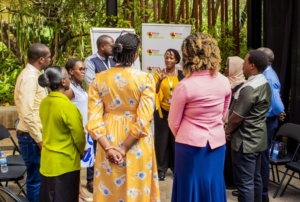Here’s how systems-thinking led to a breakthrough in tackling poverty in West Pokot
Latest posts
Share:
A renowned Kenyan Economist posited that the main challenge facing the country today is the tension between ‘politics of the economy’ and the ‘politics of development’. He goes further to explain how this is shaping the political discourse both at the national and (devolved) county levels. And the Kenyan public is fully engaged in this discourse.
Whereas Kenya’s Vision 2030 sets out a national goal for the elimination of extreme poverty, it has been criticized for being too capital-intensive and therefore struggling to adequately address extreme poverty in many parts of the country. Some county governments have embarked on a deliberate action to address this by turning the aspirations of devolution into practical efforts having effects in people’s lives.
Through an Open Society Foundation funded ‘Economic Justice Programme’ project, Wasafiri and Village Enterprise, in collaboration with the County Government of West Pokot, have successfully integrated poverty graduation into the county’s social protection programming. This was achieved in two ways:
- The birth of the first-ever county government Policy on Poverty Graduation in 2020.
- The development of a sessional paper – a legal regulatory framework that legalizes the operationalization of the poverty graduation policy- this was approved by the entire members of the West Pokot County Assembly in 2021.
Subsequently, two other policies were formulated by the County Government of West Pokot; the climate change policy and climate financing policy.
Change is Collective
The approval of the Poverty Graduation Policy was the culmination of a county-owned and led multi-stakeholder process closely linked to and leaning on the West Pokot County Integrated Development Plan’s (CIDP) mission “To Transform Livelihoods through Equitable and Sustainable Utilization of Resources”.
The focus of the CIDP is on food and nutrition security and improving equity in socio-economic opportunities, and this partly speaks to the reasons why poverty graduation has resonated so strongly in West Pokot – the first county in Kenya to develop a county-wide approach to ending extreme poverty.
This policy seeks to eliminate poverty by 2025, an ambitious goal and timeframe. In 2021, the West Pokot County Government has requested assistance from Wasafiri and Village Enterprise with the start of implementing the policy.
An evaluation done by Wasafiri and Village Enterprise during the project’s inception phase showed that government officers had a limited understanding of poverty graduation and its effectiveness in eradicating extreme poverty. Apart from low capacity, there were no guidelines on policymaking, and inadequate or no funding for poverty graduation programmes.
Four ‘areas of focus’ were articulated as a priority to address this:
- Effective targeting due to limited resources
- Layering of existing poverty eradicating interventions for extremely poor households because existing programmes are resourced, operating at scale and are the best place to start
- Galvanising resources and adapting existing programmes
- Effective monitoring
Implementation Approach
The design and implementation of this one-year ‘exit’ project draws from substantive engagement and learning from the activities and lessons during the project’s inception phase. It is hinged on three (3) key pillars:
- Strengthening capability and commitment to implement the policy focused on the four ‘areas of focus’ mentioned above through systems leadership coaching, and technical assistance
- Advocacy through lobbying for budget allocation, targeting of the extreme poor and influencing the 2023 – 2028 County Integrated Development Plan (CIDP)
- Capture knowledge of what works for learning and further capacity building
An innovative systems leadership coaching that ‘made it matter’
Wasafiri has deployed its expertise as a systems change agency to design and deliver individual and group systems leadership development coaching sessions to the policy Technical Working Group (TWG) drawn from the political, administrative, and selected community actors in West Pokot.
The format was in-person, four sessions over a four-month period and delivered as individual and group coaching.
From the Country Government, the individual coaching targeted senior policy technocrats from key departments, i.e., agriculture, budget, education, planning, trade, and social protection. The group coaching sessions targeted a broader stakeholder group comprising four County Executive Committee members (Ministers) and selected community actors and women groups who will play different critical roles that will lead to the operationalization and prioritization of the policy.
The foundation for the coaching was Wasafiri’s Systemcraft model – a framework for how we believe anyone can drive systemic change. It focuses on collective, adaptive, and experimental action on the system.
The purpose of the coaching is to strengthen the collective and adaptive capacity of the Technical Working Group (TWG) to implement the policy and achieve three outcomes:
- Secure budget allocation for the Poverty Graduation Policy (PGP) for financial year 2022 / 2023.
- Evolve and adapt existing programmes to support poverty graduation policy implementation.
- Integrate and scale scaling up poverty graduation within Country Integrated.
At the wrap up of the systems leadership coaching, we have evidence of success:
- Treasury has allocated KES 4.5M to operationalise the committees of the policy at county, sub-county, and ward levels and for identification of the policy’s target population, i.e., the extremely poor.
- The Treasury Department at the Country has taken full responsibility for taking the policy forward and strategically placed itself at the fulcrum of poverty graduation policy implementation across the whole of government. This is major progress and enhances the durability of implementation due to the influence that Treasury has in the budget process, and they have committed to ringfence allocation towards the policy.
- There was a strong endorsement of the coaching by the Head of Planning and the four County Chief Executives (CECs) who expressed the desire for Wasafiri and Village Enterprise to return and provide more systems leadership training to the County Government post the August 2022 elections.
Raising awareness, sharing lessons, and generating new support
The close of the systems leadership coaching ushers in an important phase of advocacy and learning whose goal is to secure the long-term sustainability of the poverty graduation efforts. Whilst this work is still ongoing significant achievements have been made so far.
- County Government of West Pokot is now using the policy to identify programmes under the current county development blueprints to either adopt or evolve them to support poverty graduation policy implementation. These are programmes that address the most acute aspects of poverty in West Pokot, I.e., marginalization, equality, and equity.
- Capacitating the County M&E department to develop a standard targeting tool to identify the extreme poor. This tool will be used by the county government to identify beneficiaries of graduation programmes at the county, in this case the extremely vulnerable.
- Village Enterprise continues to strengthen the agency of the local citizenry through education and awareness delivered through a series of interactive community radio shows.
- Village Enterprise with support from Wasafiri will also benefit from three (3) learning forums, one with the North Rift Economic Bloc (NOREB), a forum that brings together member counties from the North Rift regions to work together as a team on matters economy followed by a learning visit at the Council of Governors (CoG) to share best practices among devolved Governments and lastly participation in a national graduation stakeholder forum in April this year convened by BOMA and bringing together the County Governments of West Pokot and Marsabit.
What next?
Sustainability of the project is grounded on the effective stakeholder engagement processes and strategic direction and deliberations that promote ownership and cooperation among implementing partners, i.e., Wasafiri, Village Enterprise and County Government of West Pokot.
Looking beyond the August 2022 elections in Kenya, we see additional pathways to continue scaling the project mobilising for more resources from development partners to support in the identification of the extreme poor including set-up and roll-out of a robust management information system (MIS), a scaled-up citizen engagement through interactive community radio shows and additional systems leadership coaching and technical assistance in response to expected transition.
Read more about our work in West-Pokot
Photo by Rathnahar Sriom from Pexels








